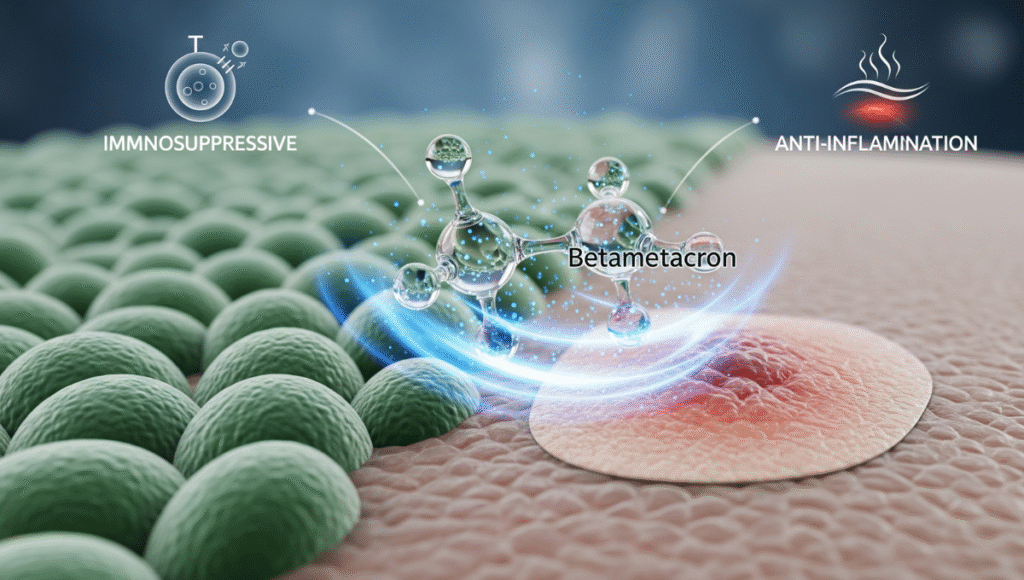In the realm of dermatology, effective treatment options are essential for managing a variety of skin conditions that affect millions worldwide. Among the many medications available, Betametacron stands out as a potent corticosteroid used to reduce inflammation, redness, and itching associated with various skin ailments. This article explores what Betametacron is, how it works, its applications, benefits, potential risks, and important precautions.
What is Betametacron?
Betametacron is a synthetic corticosteroid, a class of drugs that mimic the hormone cortisol produced naturally by the adrenal glands. Corticosteroids are renowned for their anti-inflammatory and immunosuppressive properties. Betametacron is formulated as a topical cream, ointment, or lotion for direct application to the skin, making it highly effective in treating localized skin conditions.
Note: The name “Betametacron” is sometimes used interchangeably with “Betamethasone,” but always consult your healthcare provider for the specific formulation prescribed.
How Does Betametacron Work?
Betametacron works by suppressing the immune response and reducing the production of inflammatory chemicals within the skin. This action alleviates symptoms such as swelling, redness, itching, and irritation. Its high potency makes it particularly effective for severe or resistant skin conditions.
Common Conditions Treated with Betametacron
Betametacron is primarily used to treat a variety of dermatological conditions, including:
1. Eczema (Atopic Dermatitis)
A chronic condition characterized by dry, itchy, and inflamed skin. Betametacron helps control flare-ups and reduces discomfort.
2. Psoriasis
A autoimmune condition that results in the formation of enlarged, flaky patches on the skin’s surface.Betametacron can diminish scaling, redness, and inflammation.
3. Contact Dermatitis
Skin responses triggered by exposure to allergens or irritant substances. The medication reduces allergic responses and alleviates symptoms.
4. Seborrheic Dermatitis
A condition causing flaky, greasy patches, especially on the scalp. Betametacron helps in managing inflammation and scaling.
5. Lichen Planus and Other Inflammatory Disorders
Betametacron’s anti-inflammatory properties are beneficial in controlling various inflammatory skin diseases.
Benefits of Using Betametacron
- Rapid Symptom Relief: Provides quick alleviation of itching, redness, and swelling.
- Effective for Severe Cases: Its potency makes it suitable for stubborn or resistant skin conditions.
- Localized Action: When applied topically, it minimizes systemic side effects.
- Versatile Formulations: Available as creams, ointments, and lotions to suit different skin areas and conditions.
Usage Guidelines and Precautions
While Betametacron is highly effective, correct usage is crucial to prevent adverse effects.
1. Application
- Use as prescribed by a healthcare professional.
- Apply a thin layer to the affected area.
- Do not cover the area with tight bandages unless directed, as this can increase absorption.
2. Duration
- Restrict application to the recommended duration, usually spanning several weeks.
- Overuse can cause skin thinning and other complications.
3. Avoid Certain Areas
- Do not apply near the eyes, mouth, or genital areas unless instructed.
- Avoid long-term use on large skin areas.
4. Monitor for Side Effects
- Look out for skin thinning, stretch marks, or signs of infection.
- Discontinue use and consult your doctor if adverse effects occur.
Potential Risks and Side Effects
Despite its benefits, Betametacron can cause side effects, especially with prolonged or improper use:
- Skin Thinning (Atrophy): Loss of skin elasticity.
- Stretch Marks: Due to skin weakening.
- Contact Dermatitis: Allergic reaction to the medication.
- Increased Risk of Infection: Suppressed immune response may allow infections to develop.
- Systemic Absorption: Rare but possible, leading to hormonal imbalances.
Always review your medical history and any concerns with your healthcare provider prior to beginning treatment.
Who Should Avoid Betametacron?
- Individuals with known allergies to corticosteroids.
- Those with skin infections (bacterial, viral, or fungal) unless treated concurrently.
- Pregnant or breastfeeding women should consult their doctor before use.
- Children require careful dosing and supervision due to increased risk of side effects.
Conclusion
Betametacron is a powerful and effective topical corticosteroid that provides significant relief for various inflammatory and allergic skin conditions. When used appropriately under medical supervision, it can improve quality of life by alleviating uncomfortable symptoms. However, due to potential side effects, it’s essential to follow prescribed guidelines and consult healthcare professionals for personalized advice.
If you’re considering Betametacron for your skin condition, always seek professional medical assessment to ensure it’s suitable for your specific needs and to receive proper instructions for safe and effective use.
If you’d like me to tailor this article for a specific skin condition or detail more about side effects, usage, or other aspects, just let me know!
